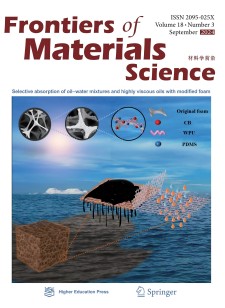Sol—gel synthesis, properties and protein loading/delivery capacity of hollow bioactive glass nanospheres with large hollow cavity and mesoporous shell
Abstract
Hollow nanospheres exhibit unique properties and find a wide interest in several potential applications such as drug delivery. Herein, novel hollow bioactive glass nanospheres (HBGn) with large hollow cavity and large mesopores in their outer shells were synthesized by a simple and facile one-pot ultrasound assisted sol—gel method using PEG as the core soft-template. Interestingly, the produced HBGn exhibited large hollow cavity with ∼43 nm in diameter and mesoporous shell of ∼37 nm in thickness and 7 nm pore size along with nanosphere size around 117 nm. XPS confirmed the presence of Si and Ca elements at the surface of the HBGn outer shell. Notably, HBGn showed high protein loading capacity (∼570 mg of Cyto c per 1 g of HBGn) in addition to controlled protein release over 5 d. HBGn also demonstrated a good in vitro capability of releasing calcium (Ca2+: 170 ppm) and silicate (SiO44−: 78 ppm) ions in an aqueous medium over 2 weeks under physiological-like conditions. Excellent in vitro growth of bone-like hydroxyapatite nanocrystals was exhibited by HBGn during the soaking in SBF. A possible underlying mechanism involving the formation of spherical aggregates (coils) of PEG was proposed for the formation process of HBGn.

 求助内容:
求助内容: 应助结果提醒方式:
应助结果提醒方式:


